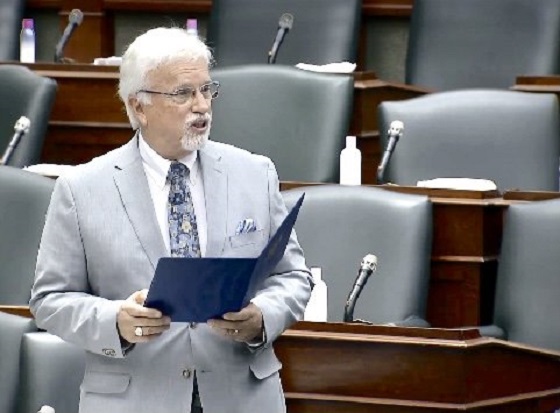National Entertainment
Legendary actress and singer Doris Day dead at 97

LOS ANGELES — Doris Day, the honey-voiced singer and actress whose film dramas, musicals and innocent sex comedies made her a top star in the 1950s and ’60s and among the most popular screen actresses in history, has died. She was 97.
The Doris Day Animal Foundation confirmed Day died early Monday at her Carmel Valley, California, home. The foundation said she was surrounded by close friends.
“Day had been in excellent physical health for her age, until recently contracting a serious case of pneumonia, resulting in her death,” the foundation said in an emailed statement.
With her lilting contralto, wholesome blonde beauty and glowing smile, she was a top box office draw and recording artist known for such films as “Pillow Talk” and “That Touch of Mink” and for such songs as “Whatever Will Be, Will Be (Que Sera, Sera)” from the Alfred Hitchcock film “The Man Who Knew Too Much.”
But over time, she became more than a name above the title: Right down to her cheerful, alliterative stage name, she stood for a time of innocence and G-rated love, a parallel world to her contemporary Marilyn Monroe. The running joke, attributed to both Groucho Marx and actor-composer Oscar Levant, was that they had known Day “before she was a virgin.”
Day herself was no Doris Day, by choice and by hard luck.
In “Pillow Talk,” released in 1959 and her first of three films with Rock Hudson, she proudly caught up with what she called “the contemporary in me.” Her 1976 tell-all book, “Doris Day: Her Own Story,” chronicled her money troubles and three failed marriages, contrasting with the happy publicity of her Hollywood career.
“I have the unfortunate reputation of being Miss Goody Two-Shoes, America’s Virgin, and all that, so I’m afraid it’s going to shock some people for me to say this, but I staunchly believe no two people should get married until they have lived together,” she wrote.
She never won an Academy Award, but Day was given a Presidential Medal of Freedom in 2004, as George W. Bush declared it “a good day for America when Doris Marianne von Kappelhoff of Evanston, Ohio decided to become an entertainer.”
In recent years, she spent much of her time advocating for animal rights. Although mostly retired from show business since the 1980s, she still had enough of a following that a 2011 collection of previously unreleased songs, “My Heart,” hit the top 10 in the United Kingdom. The same year, she received a lifetime achievement
Born to a music teacher and a housewife, she had dreamed of a dance career, but at age 12, she suffered a crippling accident: a car she was in was hit by a train and her leg was badly broken. Listening to the radio while recuperating, she began singing along with Ella Fitzgerald, “trying to catch the subtle ways she shaded her voice, the casual yet clean way she sang the words.”
Day began singing in a Cincinnati radio station, then a local nightclub, then in New York. A bandleader changed her name to Day, after the song “Day after Day,” to fit it on a marquee.
A marriage at 17 to trombonist Al Jorden ended when, she said, he beat her when she was eight months pregnant. She gave birth to her son, Terry, in early 1942. Her second marriage also was short-lived. She returned to Les Brown’s band after the first marriage broke up.
Her Hollywood career began after she sang at a Hollywood party in 1947. After early stardom as a band singer and a stint at Warner Bros., Day won the best notices of her career with “Love Me or Leave Me,” the story of songstress Ruth Etting and her gangster husband-manager. She initially balked at it, but the 1955 film became a box-office and critical success.
She followed with another impressive film, Hitchcock’s “The Man Who Knew Too Much,” starring her and James Stewart as an innocent couple ensnared in an international assassination plot. She sings “Que Sera, Sera” just as the story reaches its climax and viewers are beside themselves with suspense. The 1958 comedy “Teacher’s Pet” paired her with an aging Clark Gable as an idealistic college journalism teacher and her student, an old-school newspaper editor.
But she found her greatest success in slick, stylish sex comedies, beginning with her Oscar-nominated role in “Pillow Talk.” She and Hudson were two New Yorkers who shared a telephone party line and initially hated each other.
She followed with “The Thrill of It All,” playing a housewife who gains fame as a TV pitchwoman to the chagrin of obstetrician husband James Garner. The nation’s
Her first musical hit was the 1945 smash, “Sentimental Journey,” when she was barely in her 20s. Among the other songs she made famous were “Everybody Loves a Lover,” ”Secret Love,” and “It’s Magic,” a song from “Romance on the High Seas,” her first film.
Critic Gary Giddins called her “the coolest and sexiest female singer of slow-ballads in movie history.”
“Romance on the High Seas” had been designed for Judy Garland, then Betty Hutton. Both bowed out, and Day, recommended by songwriters Sammy Cahn and Jule Styne, won the role. Warner Bros. cashed in on its new star with a series of musicals, including “My Dream Is Yours,” ”Tea for Two” and “Lullaby of Broadway.” Her dramas included “Young Man with a Horn,” with Kirk Douglas and Lauren Bacall, and “Storm Warning,” with Ronald Reagan and Ginger Rogers.
Her last film was “With Six You Get Eggroll,” a 1968 comedy about a widow and a widower and the problems they have when blending their families.
With movies trending for more explicit sex, she turned to television to recoup her finances. “The Doris Day Show” was a moderate success in its 1966-1973 run on CBS.
Disillusionment grew in the 1960s when she discovered that failed investments by her third husband, Martin Melcher, left her deeply in debt. She eventually won a multimillion-dollar judgment against their lawyer.
She had married Melcher, who worked in her agent’s office, in 1951. He became her manager, and her son took his name. In most of the films following “Pillow Talk,” Melcher was listed as co-producer. Melcher died in 1969.
In her autobiography, Day recalled her son, Terry Melcher, telling her the $20 million she had earned had vanished and she owed around $450,000, mostly for taxes.
In 1974, Day won a $22.8 million judgment against Jerome B. Rosenthal, her lawyer and business manager, for mishandling of her and Melcher’s assets.
Terry Melcher, who died in 2004, became a songwriter and record producer, working with such stars as the Beach Boys. But he was also famous for an aspiring musician he turned down, Charles Manson. When Manson and his followers embarked on their murderous rampage in 1969, they headed for the house once owned by Melcher and instead came upon actress Sharon Tate and some visitors, all of whom were killed.
Day married a fourth time at age 52, to businessman Barry Comden in 1976. She lived in Monterey, California, devoting much of her time to the Doris Day Animal Foundation.
___
Associated Press writer Bob Thomas in Los Angeles contributed to this report.
The Associated Press
Alberta
Province adds $335 million over three years to attract more investment from Hollywood

Action! for Alberta’s film and television industry
Alberta’s screen-based sector has momentum, and Alberta’s government is helping to make the province a magnet for the job-creating film and television industry.
In 2020, Alberta’s government launched the Film and Television Tax Credit, causing the province’s film and television industry to grow in size and reputation. Since then, Alberta has attracted 129 productions with a total production value of $1.7 billion. This growth has resulted in approximately 9,000 direct and indirect jobs for Albertans.
To keep this momentum going, Alberta’s government continues to make changes to the program and increase investment in it. One year after the tax credit was launched, the cap was raised, resulting in a doubling of the province’s film and television sector. Now, Alberta’s government is increasing its investment to a total of $335 million over three years to continue attracting the attention and investment dollars of Hollywood.
“Alberta is experiencing exponential growth in our film and television sector, and we are well on our way to becoming a top Canadian jurisdiction for producers from around the world. Since the introduction of the Film and Television Tax Credit, the film and television sector in Alberta has doubled. Productions reach every part of Alberta – big cities, small towns and rural locations – and use local resources, businesses, accommodations and contractors, supporting thousands of jobs.”
As the province’s film and television industry grows, so does the quality and number of Alberta-made productions. To help grow and promote local talent and productions, Alberta’s government is also doubling the funding to the Alberta Made Screen Industries Program. This funding will support local producers and attract productions from around the world to set up shop in Alberta.
“Alberta-made film and television productions showcase Alberta’s unique culture, breathtaking landscapes and stories to audiences across the globe. We are increasing our support to smaller productions because they provide a unique Alberta-made training ground for emerging talent and create local, highly skilled workers in the sector.”
The Film and Television Tax Credit and Alberta Made Screen Industries Program work together to showcase the beauty and diversity of Alberta, create jobs, diversify the economy and support hospitality, service and tourism in the province. These targeted incentives to the film and television industries are helping to ensure Alberta remains the economic engine of Canada for years to come and the next film and television hub.
“The tax credit is central to the success of the industry. This is a competitive industry globally, and here in Alberta we’re fortunate we had the cap removed. Now we can see productions with budgets from $100,000 to well over $100 million. Now that we have a robust production environment, there are more opportunities for people to have well-paying creative jobs.”
“The Alberta government has provided supports for the film and television industry that provide certainty. It gives us more flexibility in how we’re moving forward in our film and television work and the way that we’re running our businesses.”
“Seeing the increase to the Alberta Made Production Grant in the last budget has been fantastic. It will help grow the local industry, which means so much to local performers because that’s where they build their resumés. It allows them to be a working performer, and not take side jobs or a day job somewhere else, and really focus on their craft.”
Quick facts
- According to Statistics Canada data:
- Every $1 million of production activity in the screen-based production sector creates about 13 Alberta jobs.
- Every $1 million of government investment under the Film and Television Tax Credit program is expected to support about 85 Alberta jobs.
- The film and television industry is experiencing significant growth nationally and globally.
- Every year, Alberta graduates more than 3,000 creative industry professionals from its post-secondary institutions.
- The production workforce has grown 71 per cent from 2017, or by about 4,000 workers across all positions.
- Alberta’s Film and Television Tax Credit supports medium- and large-scale productions with costs over $499,999 through a refundable tax credit on eligible Alberta production and labour costs to corporations that produce films, television series and other eligible screen-based productions.
- The Alberta Made Production Grant supports productions with a budget of up to $499,999.
- The Alberta Made Screen Industries Program, through the Alberta Made Production Grant, supports smaller productions that do not qualify for the tax credit, covering 25 per cent of eligible Alberta production costs to a maximum of $125,000.
- Every $1 investment in the Alberta Made Production Grant program generates an additional $4 in economic return.
Alberta
Edmonton to host “Road to the JUNOS Concert Series” leading up to Juno Awards week

From Explore Edmonton
Road to The JUNOS Concert Series Builds Excitement to JUNO Week.
Access and Diversity Key for Fans and Artists.
The JUNOS 2023 Host Committee is excited to announce an Edmonton-based concert series, titled Road to The JUNOS, as a lead-up to The 52nd Annual JUNO Awards Broadcast and JUNO Week from March 9-13.
The concert series will be set in small, intimate venues around Edmonton and feature local and regional artists who one day may end up on the JUNOS stage. Road to The JUNOS is a collaboration between the JUNOS 2023 Edmonton Host Committee, CBC Music and Explore Edmonton. It aims to provide excitement and create momentum leading into Canada’s biggest celebration of music.
The 10-show concert series will run from Monday, February 6 through Tuesday, February 28 at local venues in Edmonton. Of note, the artists playing these events come from a wide variety of backgrounds and genres and offer an opportunity to see some of Canada’s newest and most exciting talent. Fans can be a part of an intimate JUNOS concert with an affordable advance ticket price of only $10.

Road to The JUNOS is possible thanks in part to federal funding through PrairiesCan’s Tourism Relief Fund. This Fund is positioning Canada as a destination of choice for domestic and international travel. PrairiesCan administers the Fund in Alberta.
“Edmonton is a vibrant and dynamic cultural hub and our government’s support for Road to The JUNOS will bring that experience to visitors from across Canada and around the globe. Through the Tourism Relief Fund and our partnership with organizations such as Explore Edmonton, communities across Canada will capitalize on the jobs and economic activity generated through Edmonton’s growing tourism industry.”
– The Honourable Dan Vandal, Minister for PrairiesCan
“Road to The JUNOS is an important step in positioning Edmonton as an all-season destination and celebrating our community’s business and arts districts. I’m proud to see our government supporting Edmonton to build on its leadership in arts and culture while strengthening local tourism activity that benefits businesses in our city.”
– The Honourable Randy Boissonnault, Minister of Tourism and Associate Minister of Finance
“Road to The JUNOS is an exciting opportunity to grow Alberta’s music industry, showcasing local talent to visitors from all parts of Canada. The Alberta government is proud to support this series of concerts that features Alberta’s talent on stage as well as the venues, promoters and other music professionals.”
– The Honourable Jason Luan, Alberta Minister of Culture
“Canada has a long history of producing exceptionally talented musicians. The Road to The JUNOS concert series hopes to help give a platform to some of our up-and-coming artists and audiences a chance to say ‘we saw them when’.”
– Aimée Hill, co-chair, 2023 Host Committee
“Explore Edmonton is proud to support The JUNO Awards in March and we are delighted to be a part of this grassroots concert series. Promoting our local music venues, supporting talented Canadian musicians, and giving Edmontonians quality music experiences at an affordable price is such an important piece to the whole JUNOS experience. And we get to show off a little for the rest of Canada!”
– Traci Bednard, CEO of Explore Edmonton
The JUNOS Experience starts here. For more information and to buy tickets, visit: https://edmonton.junoawards.
-

 Alberta1 day ago
Alberta1 day agoAlberta’s vision for passenger rail
-

 COVID-192 days ago
COVID-192 days agoFormer Canadian lawmaker has no regrets about refusing COVID shot despite losing his job
-

 COVID-192 days ago
COVID-192 days agoPeckford: Hallelujah! Supreme Court of Canada to hear Newfoundland and Labrador charter case
-

 Alberta1 day ago
Alberta1 day agoThree Calgary massage parlours linked to human trafficking investigation
-

 Uncategorized1 day ago
Uncategorized1 day agoMaking Alberta a geothermal energy leader
-

 Alberta2 days ago
Alberta2 days agoCanada’s postal service refuses to help with Trudeau’s gun ban buyback program: report
-

 conflict19 hours ago
conflict19 hours agoColumbia on Lockdown After pro-Palestinian Protesters Take Over Building, Hold Janitors Hostage
-

 Canadian Energy Centre19 hours ago
Canadian Energy Centre19 hours agoNorth America LNG project cost competitiveness








